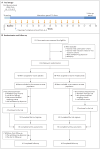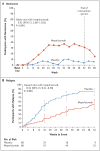Mepolizumab or Placebo for Eosinophilic Granulomatosis with Polyangiitis
- PMID: 28514601
- PMCID: PMC5548295
- DOI: 10.1056/NEJMoa1702079
Mepolizumab or Placebo for Eosinophilic Granulomatosis with Polyangiitis
Abstract
Background: Eosinophilic granulomatosis with polyangiitis is an eosinophilic vasculitis. Mepolizumab, an anti-interleukin-5 monoclonal antibody, reduces blood eosinophil counts and may have value in the treatment of eosinophilic granulomatosis with polyangiitis.
Methods: In this multicenter, double-blind, parallel-group, phase 3 trial, we randomly assigned participants with relapsing or refractory eosinophilic granulomatosis with polyangiitis who had received treatment for at least 4 weeks and were taking a stable prednisolone or prednisone dose to receive 300 mg of mepolizumab or placebo, administered subcutaneously every 4 weeks, plus standard care, for 52 weeks. The two primary end points were the accrued weeks of remission over a 52-week period, according to categorical quantification, and the proportion of participants in remission at both week 36 and week 48. Secondary end points included the time to first relapse and the average daily glucocorticoid dose (during weeks 48 through 52). The annualized relapse rate and safety were assessed.
Results: A total of 136 participants underwent randomization, with 68 participants assigned to receive mepolizumab and 68 to receive placebo. Mepolizumab treatment led to significantly more accrued weeks of remission than placebo (28% vs. 3% of the participants had ≥24 weeks of accrued remission; odds ratio, 5.91; 95% confidence interval [CI], 2.68 to 13.03; P<0.001) and a higher percentage of participants in remission at both week 36 and week 48 (32% vs. 3%; odds ratio, 16.74; 95% CI, 3.61 to 77.56; P<0.001). Remission did not occur in 47% of the participants in the mepolizumab group versus 81% of those in the placebo group. The annualized relapse rate was 1.14 in the mepolizumab group, as compared with 2.27 in the placebo group (rate ratio, 0.50; 95% CI, 0.36 to 0.70; P<0.001). A total of 44% of the participants in the mepolizumab group, as compared with 7% of those in the placebo group, had an average daily dose of prednisolone or prednisone of 4.0 mg or less per day during weeks 48 through 52 (odds ratio, 0.20; 95% CI, 0.09 to 0.41; P<0.001). The safety profile of mepolizumab was similar to that observed in previous studies.
Conclusions: In participants with eosinophilic granulomatosis with polyangiitis, mepolizumab resulted in significantly more weeks in remission and a higher proportion of participants in remission than did placebo, thus allowing for reduced glucocorticoid use. Even so, only approximately half the participants treated with mepolizumab had protocol-defined remission. (Funded by GlaxoSmithKline and the National Institute of Allergy and Infectious Diseases; ClinicalTrials.gov number, NCT02020889 .).
Conflict of interest statement
No other potential conflict of interest relevant to this article was reported.
Figures


Comment in
-
Vasculitis: Mepolizumab for eosinophilic granulomatosis with polyangiitis.Nat Rev Rheumatol. 2017 Sep;13(9):518-519. doi: 10.1038/nrrheum.2017.117. Epub 2017 Aug 3. Nat Rev Rheumatol. 2017. PMID: 28769112 No abstract available.
-
Novel Treatments for Airway Disease.N Engl J Med. 2017 Aug 10;377(6):597. doi: 10.1056/NEJMc1708004. N Engl J Med. 2017. PMID: 28792871 No abstract available.
-
Novel Treatments for Airway Disease.N Engl J Med. 2017 Aug 10;377(6):596-7. doi: 10.1056/NEJMc1708004. N Engl J Med. 2017. PMID: 28813124 No abstract available.
-
Novel Treatments for Airway Disease.N Engl J Med. 2017 Aug 10;377(6):595-6. doi: 10.1056/NEJMc1708004. N Engl J Med. 2017. PMID: 28813132 No abstract available.
-
Novel Treatments for Airway Disease.N Engl J Med. 2017 Aug 10;377(6):596-7. doi: 10.1056/NEJMc1708004. N Engl J Med. 2017. PMID: 28813133 No abstract available.
-
Novel Treatments for Airway Disease.N Engl J Med. 2017 Aug 10;377(6):597. doi: 10.1056/NEJMc1708004. N Engl J Med. 2017. PMID: 28813135 No abstract available.
References
-
- Guillevin L, Cohen P, Gayraud M, Lhote F, Jarrousse B, Casassus P. Churg-Strauss syndrome: clinical study and long-term follow-up of 96 patients. Medicine(Baltimore) 1999;78:26–37. - PubMed
-
- Jennette JC, Falk RJ, Bacon PA, et al. 2012 Revised International Chapel Hill Consensus Conference Nomenclature of Vasculitides. Arthritis Rheum. 2013;65:1–11. - PubMed
-
- Cottin V, Bel E, Bottero P, et al. Respiratory manifestations of eosinophilic granulomatosis with polyangiitis (Churg-Strauss) Eur Respir J. 2016;48:1429–41. - PubMed
Publication types
MeSH terms
Substances
Associated data
Grants and funding
LinkOut - more resources
Full Text Sources
Other Literature Sources
Medical
